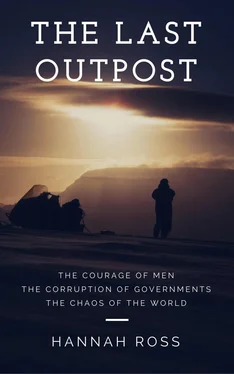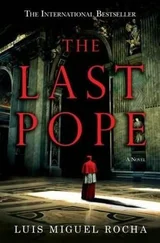He now looked forward to a respite from flying, though he knew it would be but a short one — he had already booked a flight to the port town of Ushuaia in Tierra del Fuego, and it was due to leave in three hours. It promised to be mercifully short, however, lasting just under four hours. From Ushuaia, he would make the rest of the journey to Antarctica by ship.
After checking out his luggage, Scott looked around for a cafe where he could get a decent meal and while away the remaining time. He was surprised to notice, however, that instead of the usual generic music and commercials, the loudspeakers issued something that sounded suspiciously like troubling news. People all around him were frowning and shaking their heads. Some, with a frantic look, were checking the screens of their mobile phones, others conducting hurried conversations. It seemed as though something was going on.
Scott remembered very little Spanish from the classes he had taken at high school, but he was still able to pick up some words like “danger” and “worldwide shock” and “global war”. With a mounting sense of urgency, he whipped out his mobile, which he had kept turned off throughout the flight, and logged on to a news website. What he discovered nearly made him faint: during the hours he spent hovering in the air, Russia had dropped a nuclear bomb upon Beijing. The destruction was scarcely imaginable, and the entire Far East was about to go up in flames of war. There was no hope whatsoever of mitigating the situation.
The owner of the little airport cafe where he sat down was talkative enough on the subject. “Terrible, eh, señor?” he kept saying. “Would never have thought we might live to see something like this. I can only hope all this madness doesn’t reach South America. If only the United States stay out of trouble — you are American, aren’t you, señor?”
“Yes,” Scott said curtly. He wasn’t in a great mood for talking.
“And will you be staying in Buenos Aires long?”
Scott glanced at the watch. “No, I’m boarding a plane to Ushuaia in about an hour.”
“Ah, Tierra del Fuego? I wouldn’t have thought you’re a tourist, señor.”
“I’m not. I’m a researcher. Going to sail from Ushuaia to McMurdo Antarctic station.”
“Ah!” the landlord looked impressed. “Well, at least you’re going to a place where things are guaranteed to be pretty quiet, eh?”
It was soon time to board the plane of Aerolineas Argentinas that would take him to Ushuaia. This time Scott kept part of his luggage with him, and stuffed it into a compartment above the passengers’ heads. He traveled lightly, with only one suitcase and one large backpack, but he reckoned he had packed all the essentials necessary for his stay in Antarctica — a warm parka, well-insulated waterproof pants and knee-high terrain boots, a hat with wide earflaps, scarf, gloves, many layers of warm underclothes, sunglasses and sunscreen. He didn’t fret too much over forgetting anything, though — whatever he had missed would be supplied from the stores at McMurdo.
By the time the airplane landed in Ushuaia, Scott was exhausted. He checked his ticket once again for good measure, and made sure that his ship wasn’t leaving until midmorning of the next day. This left him a night to spend in Ushuaia, and he checked into the first cheap little airport motel he could find. The accommodations couldn’t boast much more than clean sheets and hot water, but more wasn’t necessary — Scott just wanted to lay his head down somewhere and sleep. He bought himself a sandwich at the kiosk in the reception area, ate it in his room without much appetite, accompanied by a glass of weak tea he made at the kitchenette, took a quick shower, brushed his teeth, crawled under the blankets, and was asleep in five minutes.
In the morning, after having his toast and coffee, he made two phone calls. The first was to Brianna, just to update her on how his trip was progressing. She wished him luck, but he heard the resentment in her voice. She forbore, but had not forgiven.
The second call was to Professor McLaughlin, who sounded considerably more excited. “Buck, dear fellow!” his voice boomed over the phone. “I tell you, if I weren’t so old and fat, I would have given anything to be with you right now. And so you are actually sailing from Ushuaia in a couple of hours? Be sure to let me know when you get to McMurdo.”
The Polar Star was one of those ships that were made to accommodate tourists more than researchers and seamen. It boasted a wide observation lounge, a large common room, a bar, a library and a lecture and movie hall. The crowd of excitedly babbling leisure travelers made it seem as though there were no such things as war and destruction in the world. Scott frowned and gave a tiny shake of the head. He went below to his snug little cabin and stretched out on the bed, which was affixed to the wall with sturdy metal hinges.
It was spring in the southern hemisphere, and days were rapidly lengthening, which prompted people to remain on deck until a much later hour than they usually would have. Tourists were comparing the features of their cameras and talking of their plans of photographing penguin colonies. Scott, after having seen his fill of the gushing grey ocean, decided to go below to the bar and treat himself to a drink.
The ship’s bar was small but cozy, with a lot of polished wood surfaces and dimmed rosy lampshades, and soft jazz music playing in the background. There were about a dozen passengers inside, among them a dignified elderly British couple occupying a table at the back and having, in defiance of the many bottles of strong beverages lining the wall behind the bar, a cup of tea.
Scott perched on a tall chair next to the bar counter and called for a whiskey and soda. A tall, thin, angular-looking middle-aged gentleman was sitting at some distance from him, sipping a gin and tonic. He was evidently in the mood for conversation, for when he saw Scott, he moved nearer. “Good evening,” he said. “This is great, isn’t it?”
Scott merely nodded.
“Where are you from, young man?”
“Wisconsin.”
“I’m from Florida. Ike Reynolds,” his new acquaintance extended a hand, and they exchanged a handshake.
“That’s quite a bit of a climate change for you, then,” Scott remarked with a smile.
“Yes. Well, actually,” Ike lowered his voice confidentially, “I have spent a while planning a trip my wife would never want to join me on. And I succeeded — as soon as I said ‘Antarctica’, she rolled her eyes and said, Ike, you’re doing this alone. Which was just what I wanted. I’ve been married for thirty-eight years, and this is the first time I’ve managed to slip away and travel on my own. I intend to make the most of it. Are you married?”
“Yes,” Scott said with a sigh, remembering Brianna’s tears as she kissed him in the airport. “My wife didn’t want to join me either,” he confessed.
“You look sorry for it. Don’t be, young man. Trust me, you’ll have plenty of time to spend with your missis when you get back home a few weeks later. Enjoy your independence while you can.”
Scott decided not to go into the details of his newly accepted position as the general overseer at McMurdo. He merely took another sip of whiskey and soda, and was surprised to see the bottom of his glass.
“Another drink?” Reynolds offered. “My treat. I’m having another one myself.”
They clinked glasses.
“It’s comforting,” Ike went on after another sip of gin and tonic, “to be heading into this last pristine wilderness in the world. No matter what crazy idea pops into the heads of our leaders, here we’re well away from it all, at least for a while. Honestly, I sometimes contemplate taking out my savings and moving to Tierra del Fuego or some other remote spot on the globe.”
Читать дальше












